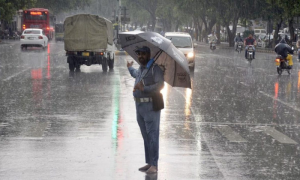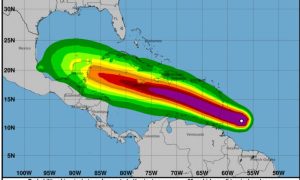ISLAMABAD: A top UN official on Thursday warned that an estimated 200,000 people in Pakistan could be affected by the upcoming monsoon season, which is expected to bring higher-than-usual rainfalls.
The United Nations, in collaboration with local authorities, has devised a contingency plan, allocating $40 million to address potential emergencies, stated Mohamed Yahya, the newly appointed Resident Coordinator and Humanitarian Coordinator in Pakistan.
Yahya informed journalists in Islamabad that Pakistani weather forecasters are predicting above-normal rainfall in the coming weeks. However, he said that the rains would not reach the severity of the 2022 floods, which claimed 1,739 lives, destroyed 2 million homes, and submerged up to one-third of the country at its peak.
Pakistan ranks among the most vulnerable countries to climate change, partly due to its massive northern glaciers, now melting as air temperatures rise. Warmer air can also hold more moisture, intensifying monsoon rains.
Until recently, public opinion and even some government officials underestimated the potential negative impact of climate change on daily life. However, shifting weather patterns in Pakistan have forced cities to bolster infrastructure and farmers to adapt their practices.
The 2022 floods inflicted over $30 billion in damage on Pakistan’s already struggling economy. Analysts and government officials attribute Pakistan’s recent economic growth challenges to man-made disasters, including droughts, heatwaves, and heavy rains, which have severely damaged roads, bridges, power systems, and other infrastructure.
Despite contributing less than 1 percent to global carbon emissions, Pakistan is disproportionately affected by climate disasters. This year, the country recorded its wettest April since 1961, with more than double the usual monthly rainfall.
Yahya mentioned that he is in contact with officials at Pakistan’s Ministry of Climate Change, who are preparing their own contingency plans for the monsoon season, which runs from July to October.
Earlier this week, Pakistani weather forecasters urged people to stay indoors as the third heatwave of the month began.
A recent study by the United Nations Children’s Agency suggested that Pakistan could prevent 175,000 deaths by 2030 by developing resilient energy systems for its health facilities.
On Thursday, temperatures in various parts of Pakistan soared to 48 degrees Celsius (118 degrees Fahrenheit), forcing many to stay indoors. Authorities are advising people to stay hydrated and avoid unnecessary travel.
























